

Interview at Pause and Select – Jolyon Thomas. I had a really great time in a recent interview I did with the YouTube channel Pause & Select.
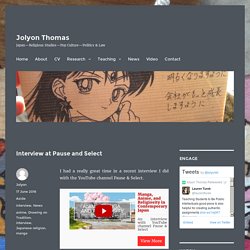
Manga, Anime, and Religiosity in Contemporary Japan An interview with YouTube channel Pause & Select It was particularly gratifying and amazing to see so many viewers on YouTube and reddit respond to the interview both positively and critically within the first 12 hours or so that it has been up. I promised at the end of the interview to be in dialogue with viewers, so here are some thoughts on questions that people raised, offered in three broad categories: But isn’t Thomas’s definition of religion too expansive? I’ve spent a lot of time thinking about this question, and indeed it is the problem of defining religion that inspired me to write Drawing on Tradition in the first place. Intersectionality. Theoretical framework of multidimensional oppression An intersectional analysis considers all the factors that apply to an individual in combination, rather than considering each factor in isolation.
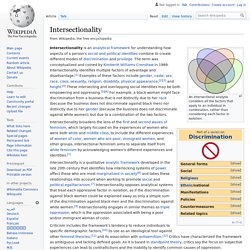
Intersectionality broadens the lens of the first and second waves of feminism, which largely focused on the experiences of women who were both white and middle-class, to include the different experiences of women of color, women who are poor, immigrant women, and other groups. Intersectional feminism aims to separate itself from white feminism by acknowledging women's different experiences and identities.[6] Intersectionality has been critiqued as being inherently ambiguous. The ambiguity of this theory means that it can be perceived as unorganized and lacking a clear set of defining goals. Historical background[edit] Intersectionality originated from critical race studies and entails the interconnection of gender and race (Nash 2008). Feminist thought[edit] W. Key concepts[edit] Criticism[edit] Anarchy Lives: Rojava. I Grew Up in a Polyamorous Household. Few cultural symbols have as much heft as the "traditional" nuclear family. You know the one: two heterosexual parents, two kids, one dog, two tablespoons of white picket fence, whisk gently.
Don't get me wrong, there's nothing wrong with that—it's just not how I was raised. My parents are polyamorous, a Greek/Latin mishmash word meaning romantic non-monogamy with the consent of everyone involved. Teens are fleeing religion like never before: Massive new study exposes religion’s decline : science. The Web Is Not a Post-Racial Utopia. Rust, a 2013 indie survival game from Facepunch Studios, plays like a cross between Minecraft and Grand Theft Auto.
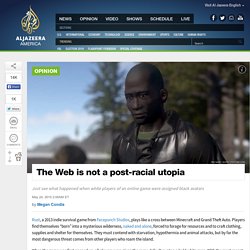
Players find themselves “born” into a mysterious wilderness, naked and alone, forced to forage for resources and to craft clothing, supplies and shelter for themselves. They must contend with starvation, hypothermia and animal attacks, but by far the most dangerous threat comes from other players who roam the island. When the game was first opened up, all players were given the same default avatar: a bald white man. The Pencilsword: On a Plate. The world’s languages, in 7 maps and charts. These seven maps and charts, visualized by The Washington Post, will help you understand how diverse other parts of the world are in terms of languages. 1.
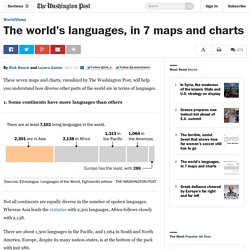
Some continents have more languages than others. Why we shouldn’t judge a country by its GDP. Analysts, reporters and big thinkers love to talk about Gross Domestic Product.
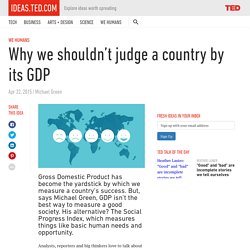
Put simply, GDP, which tallies the value of all the goods and services produced by a country each year, has become the yardstick by which we measure a country’s success. But there’s a big, elephant-like problem with that: GDP only accounts for a country’s economic performance, not the happiness or well-being of its citizens. With GDP, if your richest 100 people get richer, your GDP rises … but most of your citizens are just as badly off as they were before. That’s one of the reasons the team that I lead at the Social Progress Imperative launched the Social Progress Index in 2014. Together, these 12 components form the Social Progress framework. Chart 1: The top 68 countries on The Social Progress Index It’s interesting, but not particularly surprising, that the results at the top of the 2015 Index are actually pretty similar to last year’s.
Norway topped our list this year. Facebook status updates reveal low self-esteem and narcissism. People who post Facebook status updates about their romantic partner are more likely to have low self-esteem, while those who brag about diets, exercise, and accomplishments are typically narcissists, according to new research.
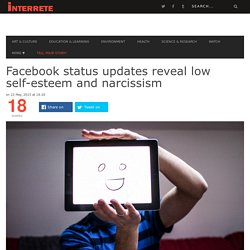
Psychologists at Brunel University London surveyed Facebook users to examine the personality traits and motives that influence the topics they choose to write about in their status updates — something that few previous studies have explored. The data was collected from 555 Facebook users who completed online surveys measuring the ‘Big Five’ personality traits — extroversion, neuroticism, openness, agreeableness and conscientiousness — as well as self-esteem and narcissism.
The research found: People with low self-esteem more frequently posted status updates about their current romantic partner.Narcissists more frequently updated about their achievements, which was motivated by their need for attention and validation from the Facebook community. Journal References: Wordcloud from messages in a long distance relationship - Album on Imgur. If the World were 100 PEOPLE.